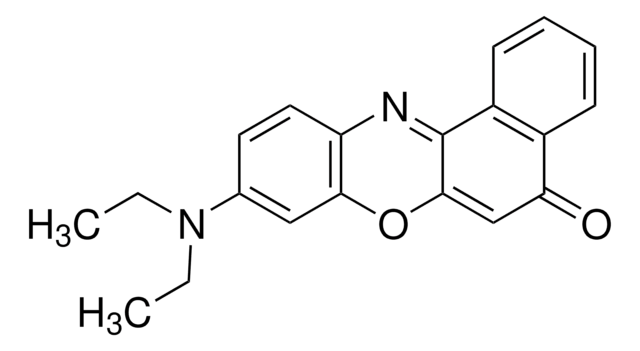94563
Dimethyl sulfoxide
analytical standard
Synonym(s):
DMSO
About This Item
Recommended Products
grade
analytical standard
Quality Level
vapor density
2.7 (vs air)
vapor pressure
0.42 mmHg ( 20 °C)
Assay
≥99.95% (GC)
autoignition temp.
573 °F
shelf life
limited shelf life, expiry date on the label
expl. lim.
42 %, 63 °F
technique(s)
HPLC: suitable
gas chromatography (GC): suitable
refractive index
n20/D 1.479 (lit.)
n20/D 1.479
bp
189 °C (lit.)
mp
16-19 °C (lit.)
solubility
H2O: miscible (completely)
density
1.10 g/mL (lit.)
application(s)
cleaning products
cosmetics
environmental
flavors and fragrances
food and beverages
personal care
format
neat
SMILES string
CS(C)=O
InChI
1S/C2H6OS/c1-4(2)3/h1-2H3
InChI key
IAZDPXIOMUYVGZ-UHFFFAOYSA-N
Looking for similar products? Visit Product Comparison Guide
General description
Application
Caution
Other Notes
Dimethyl Sulfoxide Miscibility/Immiscibility Table
Recommended products
Storage Class Code
10 - Combustible liquids
WGK
WGK 1
Flash Point(F)
188.6 °F - closed cup
Flash Point(C)
87 °C - closed cup
Personal Protective Equipment
Choose from one of the most recent versions:
Already Own This Product?
Find documentation for the products that you have recently purchased in the Document Library.
Customers Also Viewed
Articles
Butyl methyl ether; Acetic acid; 2-Butanone; Ethyl acetate; Tetrahydrofuran; 1-Butanol; Isopropyl acetate; Heptane; Propyl acetate; 3-Methylbutanol; 4-Methyl-2-pentanone; Isobutyl acetate; Butyl acetate; Dimethyl sulfoxide; Anisole; Cumene
Protocols
GC Analysis of Class 3 Residual Solvents on SUPELCOWAX® 10
Our team of scientists has experience in all areas of research including Life Science, Material Science, Chemical Synthesis, Chromatography, Analytical and many others.
Contact Technical Service

